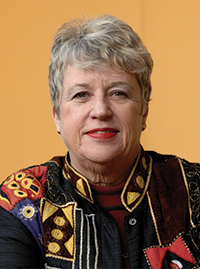Borlaug Centennial Q&A's with Experts:
If Norman Borlaug posed the following questions to you... what would you tell him?

"If you want to help, start by listening... Understand problems."
Margaret Catley-Carlson, Water Expert and Member of the World Food Prize Council of Advisors
Q. What’s the one thing – the single most important – that we need to address to solve food insecurity?
A. There is no single thing – that’s why it is so difficult. Are there roads? Is there any access of ag inputs? Is water supply reliable? Any access to improved seeds? Any access to credit? Is it blocked by ownership arrangements for females? And on and on. Each one of these can be THE single most important, depending on the circumstances – and they iteract.
Q. Do you think we can feed 9 billion people by the year 2050? If so, why? If not, why not?
A. We could but we probably won’t. Problems of the poor just aren’t that interesting to the relevant national governments.
Q. Where are the biggest gaps right now in the food system?
A. I really think Extension services – either new forms of electronic communication if they work and really talk to people and are accessible, or more classic forms. Next would be rural roads.
Q. What’s one piece of advice you would give to young people?
A. If you want to help, start by listening. Don’t start by bringing solutions to problems. Understand problems.
Q. How would you explain what you do, and why it’s important, to a 10-year-old?
A. Many people in the world don’t have access all the time to the water they need for their families and to grow food. All over the world, there are groups and people and governments trying to help them; I try to make these more effective and efficient.
Q. Within your area of expertise, what is one misunderstood or neglected topic you could shed some light on for readers?
A. Genetically modified foods, the need to pay for water services or systems will suffer.
Q. What is the most interesting project going on right now – yours or someone else’s - that more people should know about?
A. Fertilizer Deep Placement – 2 million Asian farmers have increased yield and decreased fertilizer use AND therefore water pollution. It could work for the Toledo reservoir and reduce hypoxic zones in the Gulf of Mexico, too.
Q. What’s one thing the general population could do to make an impact on global food security?
A. Stop wasting food – today – in restaurants, from lunch boxes, from your own refrigerator. If 40% of the food grown is wasted or thrown out, that’s the equivalent of throwing out 40% of the water we use to grow food (and 70%+ of our water use goes to food).
Q. What is one of your favorite quotes or words to live by?
A. "We can't solve problems by using the same kind of thinking we used when we created them." - Albert Einstein
Q. Share with us one of your most unique life experiences and what it taught you.
A. Sitting on a hillside in India,looking at a valley that was restored simply by changing the social arrangements to give the rural people access and ownership and the ability to gain livelihoods – and therefore interest in protecting it. As I sat in the warm autumn sun, a spring which had reappeared after being non-existant for years glinted in the sun – and a peacock swooped down and washed his extended tailfeathers in the sparkling water. Four years earlier, the little valley was desertified and the spring was dry. What it taught me? Ask what the problems are before rushing in with solutions. They may be very simple – but since power relationships are always involved, very difficult.


